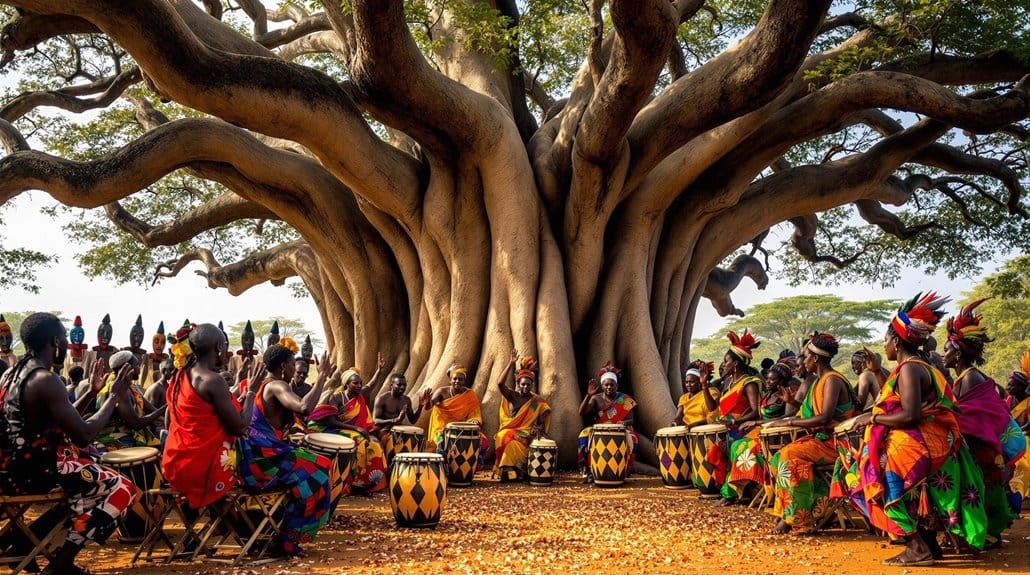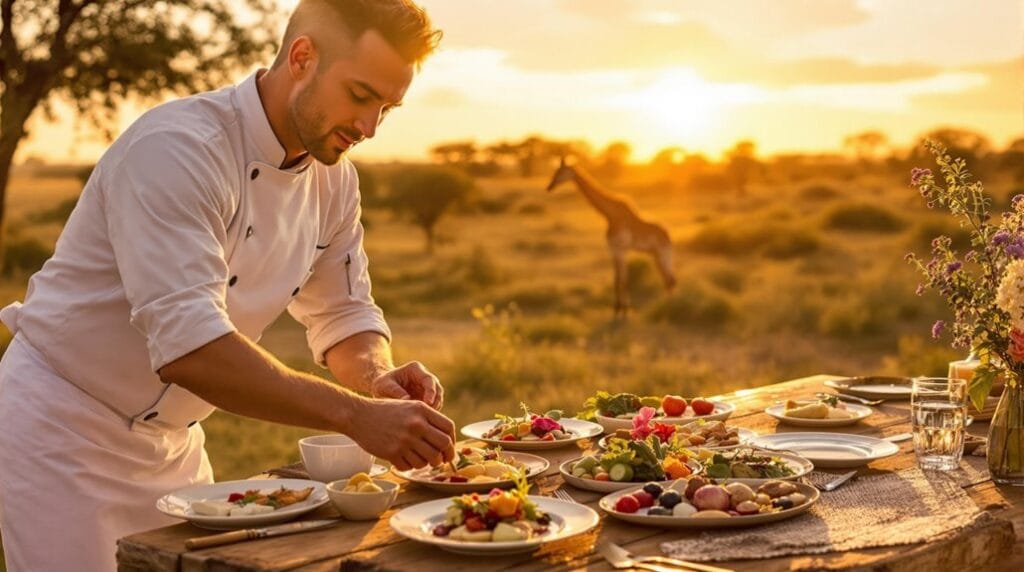Imagine a well-tended garden where each plant represents a story passed down through generations, thriving under the care of its keeper. You might wonder how African ancestral rituals serve as the rich soil nurturing this garden, fostering growth and connection to cultural heritage. These practices not only honor the past but also shape the present, binding communities together in powerful ways. As you explore the layers of meaning and significance behind these rituals, you'll uncover their role in resilience and identity, prompting a deeper understanding of what it means to belong.
Key Takeaways
- African ancestral rituals connect the living with their ancestors, providing blessings, protection, and guidance through communal participation and remembrance.
- Ancestor worship reinforces cultural identity, as neglecting these practices can lead to misfortune and a sense of disconnection from heritage.
- Rituals vary regionally, incorporating unique cultural expressions such as music, dance, and storytelling, enhancing the communal bond and celebrating shared history.
- Syncretism allows ancestral rituals to coexist with Christianity and Islam, fostering inclusivity, mutual respect, and a richer spiritual experience for communities.
- Oral traditions play a crucial role in transmitting spiritual knowledge and moral values, maintaining cultural identity and strengthening community ties amid modern challenges.
Historical Context of African Spirituality
Amidst the complexities of Africa's diverse cultures, understanding the historical context of African spirituality reveals a rich tapestry woven with threads of resilience and adaptation. Your exploration of this topic uncovers how colonialism disrupted traditional practices and sought to suppress indigenous beliefs.
Colonial powers and missionaries condemned African spirituality as primitive, pushing for forced conversions that aimed to eradicate ancestral religions.
Yet, amidst these challenges, African communities exhibited remarkable resilience. When enslaved, they often blended their spiritual elements with those of their oppressors, creating syncretic traditions that allowed them to preserve essential aspects of their heritage. This fusion wasn't merely survival; it became a powerful assertion of identity.
You'll see how these adaptations formed a spiritual bridge, connecting the past to the present, allowing individuals to maintain a sense of belonging.
The historical context surrounding African spirituality reveals the long-term effects of colonialism and the resilience of those who fought to keep their traditions alive. By acknowledging this history, you can appreciate the depth and richness of African spirituality, understanding that its evolution reflects a profound journey of survival, adaptation, and the unwavering spirit of its people.
Significance of Ancestor Worship
Ancestor worship holds immense significance in many traditional African religions, acting as an essential thread that weaves together the past and present. You might witness how families gather around ancestral shrines, performing rituals that honor their ancestral spirits. These practices aren't just about remembrance; they're crucial for invoking blessings and protection for the living. Here, ancestors aren't seen as distant figures; they occupy a higher existence, acting as mediators between the divine and human domains.
As you participate in these rituals, you'll feel the palpable sense of communal cohesion. Everyone joins in, reinforcing cultural identity and shared values, reminding you that you're part of something larger. The act of honoring your ancestors fosters a connection that resonates deeply within the community, ensuring that no one feels isolated in their journey through life.
During significant events, you can call upon these ancestral spirits for guidance, feeling their influence in your decisions and paths. Neglecting these practices might lead to misfortune, severing that crucial connection.
Core Beliefs and Practices
In traditional African religions, the core beliefs and practices form a rich tapestry that shapes community life and individual identity. At the heart of these traditions lies ancestor veneration, where ancestral spirits are honored for their divine influence on the living. This interconnectedness between the physical and spiritual domains fosters a strong sense of belonging within the community.
| Core Beliefs | Spiritual Practices | Role of Spiritual Leaders |
|---|---|---|
| Ancestor Veneration | Rituals and Sacrifices | Facilitate Healing and Divination |
| Afterlife Concepts | Communal Gatherings | Guide Spiritual Journeys |
| Reincarnation | Offerings to Ancestors | Mediate Between Domains |
| Cosmological Beliefs | Celebrations of Natural Phenomena | Teach Traditional Beliefs |
| Cultural Identity | Daily Spiritual Practices | Promote Community Cohesion |
Through rituals and sacrifices, communities express their traditional beliefs, reinforcing their cultural identity. Spiritual leaders play an essential role, guiding individuals in maneuvering life's challenges through healing and divination. Together, these core beliefs and practices create a vibrant communal fabric, where every member feels a deep connection to their ancestors and the spiritual world, thereby nurturing a sense of belonging and continuity.
Cultural Expressions and Rituals
Through communal participation, cultural expressions and rituals in traditional African religions serve as significant conduits for honoring ancestors and fostering community identity. You'll find that ancestral rituals are often vibrant gatherings, where offerings and sacrifices create a connection to the spiritual domain. Participants share in the collective experience, reinforcing cultural identity and community welfare.
Music and dance play an important role during these rituals, as they not only evoke emotions but also tell stories of ancestors and their profound impacts on the living. When you engage in this rhythmic celebration, you're embracing the concept of Ubuntu, which emphasizes our interconnectedness and the importance of harmony within the community.
Storytelling, another essential element, allows individuals to pass down wisdom and teachings, creating a sense of belonging among participants. The rituals often revolve around local deities and ancestral lineages, emphasizing the community's relationship with the land and environment.
Role of Oral Traditions
Oral traditions are the lifeblood of African spirituality, weaving together the threads of cultural, historical, and religious knowledge that bind communities. These narratives not only reflect the past but also shape the present, allowing you to connect deeply with your ancestors and cultural identity.
Here's why they matter:
- Transmission of Knowledge: Oral traditions serve as a primary means of sharing religious knowledge, ensuring that moral values and community ties are preserved across generations.
- Cultural Flexibility: Without a single codified text, these traditions encourage the integration of diverse religious ideas, allowing beliefs to adapt to local customs and experiences.
- Myths and Folklore: Stories and folklore explain creation and moral conduct, influencing how you view the world and your place within it.
Through engaging with oral traditions, you're not just listening; you're participating in a rich tapestry of beliefs that honor the guidance of your ancestors.
This preservation of oral narratives is essential for maintaining your community's cultural identity amidst the challenges of modern life. By embracing these stories, you strengthen the bonds that tie you to your heritage and to each other.
Spiritual Leaders and Community
Spiritual leaders hold a pivotal role in the fabric of African communities, serving as essential links between the people and the divine. These leaders, often priests or diviners, undergo extensive training, ensuring they possess the knowledge needed to guide moral conduct and spiritual practices.
When you participate in rituals led by these spiritual leaders, you're not just engaging in tradition; you're reinforcing social cohesion and cultural identity. Rituals often involve communal celebrations, sacrifices, and offerings to ancestors, creating a shared experience that deepens your connection to the community.
Spiritual leaders also act as custodians of oral traditions, preserving stories and teachings that shape your identity. Their influence extends beyond spiritual matters; they provide guidance on social issues, promoting communal welfare and well-being.
In this way, spiritual leaders foster a sense of belonging, reminding you of your roots and the values that bind you to your community. Their role transcends mere leadership; they cultivate a nurturing environment where you can find solace, support, and direction, ensuring that the essence of your cultural identity flourishes amid the complexities of life.
Modern Challenges and Adaptations
As you explore the landscape of modern African ancestral rituals, you'll encounter significant challenges like persecution and misunderstanding from dominant religious groups.
Yet, amidst this adversity, you'll also witness a vibrant syncretism that blends traditional beliefs with contemporary influences, showcasing a resilient cultural revival.
Persecution and Misunderstanding
In the face of modern challenges, traditional African religions often find themselves under siege, grappling with persecution from dominant Christian and Muslim groups. This persecution manifests in forced conversions and societal discrimination, leading to a decline in the open practice of indigenous beliefs.
Many practitioners face misunderstanding and demonization, which only exacerbates their struggle for acceptance. Amidst these challenges, however, a revival is stirring. It's essential to recognize the resilience of those who hold onto their traditions, maneuvering a complex landscape with grace.
Here are three key aspects to reflect on:
- Cultural Significance: Traditional African religions aren't merely rituals; they encompass rich histories and values that shape identity.
- Adaptability: Many individuals blend elements of their indigenous practices with Christianity or Islam, showcasing a form of syncretism that highlights their adaptability.
- Community Support: As practitioners gather and share their experiences, they foster a sense of belonging, reinforcing the importance of their ancestral rituals.
Acknowledging these dynamics can help bridge the gap of misunderstanding and promote a deeper appreciation for the cultural significance of traditional African religions.
Syncretism and Cultural Revival
The resilience of traditional African religions shines through in their ability to adapt and flourish, even amidst modern challenges. You'll notice how syncretism allows individuals to blend ancestral rituals with elements of Christianity and Islam, creating vibrant cultural expressions that reflect both indigenous and Abrahamic influences.
This dynamic fusion is particularly evident in the Americas, where the Yoruba and Igbo religions have adapted, showcasing the strength of traditional African practices in new environments.
As you engage with communities rediscovering their roots, you'll witness a growing cultural revival that embraces ancestral beliefs despite facing persecution and discrimination. People are reclaiming their heritage, integrating ancient rituals with modern spiritual elements, all while holding onto core tenets like ancestor veneration.
The concept of Ubuntu plays a crucial role in this revival, emphasizing interconnectedness and communal sharing. This philosophy fosters harmony and spiritual connection across diverse ethnic groups in Africa, reinforcing the idea that you're never alone in your spiritual journey.
Regional Variations in Practices
Across Africa, ancestral rituals manifest in diverse and vibrant forms, shaped by the unique cultural landscapes of various ethnic groups. You'll find that these regional variations not only reflect the distinct traditions but also reinforce communal identity.
Consider these examples:
- Yoruba: In Nigeria, elaborate ceremonies and offerings are central to honoring ancestors, creating a profound connection between the living and the dead.
- Zulu: In South Africa, rituals often involve animal sacrifices, emphasizing the importance of maintaining strong ancestral ties through physical acts of devotion.
- Akan: In West Africa, pouring libations and celebrating annual festivals symbolize deep respect for ancestors, fostering a sense of belonging within the community.
In Central Africa, Bantu-speaking communities enrich their ancestral worship with music and dance, essential expressions of their cultural heritage.
Meanwhile, in the Americas, the African diaspora has adapted ancestral veneration, blending local customs with religious elements.
Despite the global spread of Christianity and Islam, many African communities continue these rituals, showcasing their resilience and the enduring significance of ancestral worship in preserving cultural identity.
Impact of the African Diaspora
As you explore the impact of the African diaspora, you'll notice how cultural adaptation has shaped unique spiritual practices across different regions.
In places like Cuba, Haiti, and Brazil, you can see the resilience of African ancestral beliefs, intricately woven with local customs and religions.
This blending not only honors ancestral connections but also showcases the dynamic nature of spirituality in the face of historical challenges.
Cultural Adaptation and Resilience
Cultural adaptation and resilience within African diaspora communities highlight how individuals have creatively woven their ancestral beliefs into new contexts. You can see this vibrant blend in the emergence of syncretic religions like Cuban Regla de Ocha and Haitian Vodou. These practices preserve spiritual heritage while embracing local cultural elements.
Here are three key aspects of this adaptation:
- Ancestral Veneration: Many Afro-American religions prioritize honoring ancestors, reflecting a belief in their ongoing influence in daily life.
- Community Identity: Rituals and celebrations centered on ancestral ties strengthen communal bonds, fostering a deep sense of belonging and shared heritage.
- Folk Practices: Despite the oppressive histories, enslaved Africans maintained unique traditions, blending African spiritual practices with elements from Christianity and other local religions.
The resilience displayed by these communities shows how they've turned adversity into a rich tapestry of cultural expression.
Through their rituals and beliefs, they not only preserve their African roots but also adapt to and thrive in new environments.
This ongoing journey of cultural adaptation reveals the strength and unity found within the African diaspora, creating spaces where individuals can connect with their spiritual heritage and community identity.
Spiritual Practices in Diaspora
How do spiritual practices evolve within the African diaspora, and what do they reveal about identity and resilience? In exploring the rich tapestry of African diaspora religions, you'll find a profound blending of traditional beliefs and contemporary influences. This adaptability showcases the resilience of communities that have faced significant challenges yet continue to honor their ancestors through vibrant spiritual practices.
Here's a glimpse into these practices:
| Spiritual Practice | Key Element | Cultural Significance |
|---|---|---|
| Ancestor Worship | Veneration of Ancestors | Essential for community identity and well-being |
| Syncretic Religions | Blending Traditions | Reflects adaptability and inclusivity |
| Oral Traditions | Storytelling | Preserves cultural identity across generations |
Throughout the diaspora, you'll notice how these spiritual practices foster community ties, allowing individuals to connect deeply with their heritage. Through the preservation of oral traditions, the wisdom of ancestors is passed down, reinforcing bonds that transcend time and space. Despite facing marginalization, these practices not only survive but thrive, illustrating the enduring spirit of those who seek belonging and connection.
Coexistence With Other Religions
In the vibrant tapestry of African spirituality, traditional beliefs intertwine with Christianity and Islam, creating a dynamic coexistence that shapes everyday life. You'll find that many individuals embrace a syncretic spirituality, blending ancestral worship with elements from these Abrahamic faiths. This coexistence reflects the resilience and adaptability of African cultures, where rituals from different traditions coexist and enrich community life.
Consider these key aspects of this spiritual interplay:
- Ubuntu: This philosophy emphasizes interconnectedness and communal living, fostering harmony among diverse religious practices.
- Cultural Expressions: Many Africans practice their traditional religions alongside Christianity and Islam, creating unique cultural expressions that celebrate their heritage.
- Ongoing Influence: Studies reveal that even after conversion, many Christians and Muslims retain aspects of traditional beliefs, showcasing the enduring legacy of ancestral rituals.
Through observation, you can witness how these spiritual beliefs create a sense of belonging and identity. The blending of traditions not only highlights the importance of coexistence but also enriches the communal fabric that ties together diverse faiths across the continent and beyond.
Frequently Asked Questions
What Is the Importance of African Rituals?
African rituals strengthen your cultural identity and foster community bonding. They connect you spiritually, guide life changes, impart moral teachings, preserve generational wisdom, promote healing practices, and honor nature, ensuring social cohesion and historical continuity.
What Is the Significance of Ancestors in African Traditions?
In African traditions, ancestor veneration offers spiritual guidance, strengthens cultural identity, and fosters lineage connection. Through respect rituals, you honor moral teachings, guarantee community cohesion, and preserve historical continuity, enriching your family legacy and sense of belonging.
What Are the Three Types of African Rituals?
You'll discover three main types of African rituals: initiation ceremonies marking life changes, seasonal celebrations like harvest festivals honoring ancestors, and healing rituals involving divination practices, all fostering community bonds and shared cultural identity.
Why Birth Rituals Are Very Important in African Culture?
Birth rituals in African culture embody new life, fostering family bonding and community celebration. They provide spiritual guidance through healing practices, reinforce gender roles, and preserve generational wisdom, enriching your cultural identity with deep ritual symbolism.
Conclusion
As you explore the vibrant world of African ancestral rituals, you uncover layers of meaning that stretch far beyond mere tradition. What happens when these ancient practices face modern challenges? How do communities adapt while preserving their essence? You'll find that the dance between past and present is not just a survival tactic; it's a profound reflection of resilience and identity. The echoes of ancestors continue to guide, reminding you that every ritual holds a story waiting to be told.








